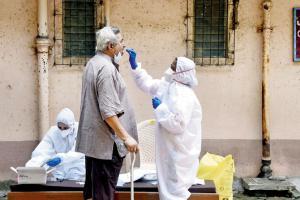In a country with too few tests, all administered as fast as possible, how is a person to know if their test result is truly what it seems?

Borivli residents get tested for COVID-19 through the Rapid Antigen Test at a testing camp. Pic/Satej Shinde

There was nothing wrong with Mr Chatterjee. He'd just returned from Hyderabad to Mumbai, and on a whim decided to get himself tested for COVID-19. A private Mumbai lab came home to take a pharyngeal swab. He chose the WHO-recommended PCR (Polymerase Chain Reaction) test, the costliest available at about Rs 2,400.
ADVERTISEMENT
The test declared Mr Chatterjee positive. He was an asymptomatic carrier.
In a day, his life was upended. A municipal task force arrived to test his entire family, domestic staff and anyone else who had been in recent direct contact with him, some 12 to 15 people.
A grim sign was tacked on the door warning visitors that a fellow with the dreaded virus lurked within. Word spread rapidly through the building complex.
Mr Chatterjee did what people do when they test positive for any disease: refused to believe it and asked for a re-test. Surprise — the second test, a PCR done at a different lab, found him negative and uninfected.
Chatterjee called me in Bangkok, irate and flabbergasted. "Which test should I believe?" he demanded. "What's going on in India with these tests?"
Let me break it to you gently. You can never know for sure that any test result is 100% accurate or true. Test results are existential mysteries.
It's like drawing a 10,000 rupees from an ATM. No matter how many times you count the notes, you can never know for sure if you missed a note or counted one twice. If you get the same number over two counts, you just stop there. But if your first two counts vary, you do a third count and take the best of three.
I'm putting together this layman's guide for you because it can be a nightmare to test COVID-positive.
Currently, there are three tests for COVID infection. The PCR, also called the molecular test because it detects pieces of the virus's genetic material, is the most accurate but gives false negatives about 30% of the time.
The antigen test, commoner and cheaper at about Rs 450 a pop, looks for fragments of the virus's protein. Results come in minutes but about 50% of the time you'll get a false negative. You'd get the same accuracy if you'd flipped a coin each time instead of testing.
Both these tests detect active infection, while the antibody test is good mainly for identifying people who have recovered from past COVID-19 infection on their own. It looks for antibodies — protein soldiers that your body produces to fight a specific disease. It's like seeing a wounded war veteran and concluding that there must have been war somewhere which he won.
The problem with false negatives is that you think you're fine but you're actually infected and making others sick.
The problem with false positives is that your life becomes pure hell.
India's testing capacity is 35,842 tests per million people — spectacularly low for a country so populous and so proud of its supremacy. It is also one of the world's lowest testing rates — fully 118 countries test more people per million than we do. The USA, despite its moronic president who disparages testing, tests 263,991 per million.
India's current strategy for testing more people seems to be getting even more Rapid Antigen Tests — yes, the ones that give false negatives half the time.
What about false positives, like the one Mr Chatterjee got? Could it be some unscrupulous lab manager trying to increase business? Let's follow the money trail. When a person tests positive, 10-15 others in his inner circle must be tested right away. That's Rs 72,000 right there. A lab testing 35,000 or so samples a day would earn Rs 840,000.
What if the lab manager 'seeded' his data by switching about 5% of the negatives into false positives? Suddenly 175 people more would go through what Mr Chatterjee did — and the lab would test about 2,600 people who had been in close contact with them.
Between an incompetent bureaucracy trying to fudge numbers and opportunistic lab entrepreneurs, should we assume you're damned?
Back to Mr Chatterjee and the great unknowns of life. How should a person assess a positive test's reliability? There's a useful concept called the Positive Predictive Value, which tells you how likely it is that a positive result is really a positive. The mathematics is that if the total number of positives in your environment is high and rising, then your positive is more likely to be true than false. If it's low, maybe you have a false positive.
In other words, if you go prawn fishing and net a huge catch, there must be many more prawns in the sea. A small catch would mean there were hardly any prawns left.
I advised Mr Chatterjee to just go for a third test, and take the best of three. To everyone's relief, he came out negative. He's now alive and well and living quite happily in confusion.
Here, viewed from there. C Y Gopinath, in Bangkok, throws unique light and shadows on Mumbai, the city that raised him. You can reach him at cygopi@gmail.com
Send your feedback to mailbag@mid-day.com
The views expressed in this column are the individual's and don't represent those of the paper
Keep scrolling to read more news
Catch up on all the latest Mumbai news, crime news, current affairs, and a complete guide from food to things to do and events across Mumbai. Also download the new mid-day Android and iOS apps to get latest updates.
Mid-Day is now on Telegram. Click here to join our channel (@middayinfomedialtd) and stay updated with the latest news
 Subscribe today by clicking the link and stay updated with the latest news!" Click here!
Subscribe today by clicking the link and stay updated with the latest news!" Click here!







